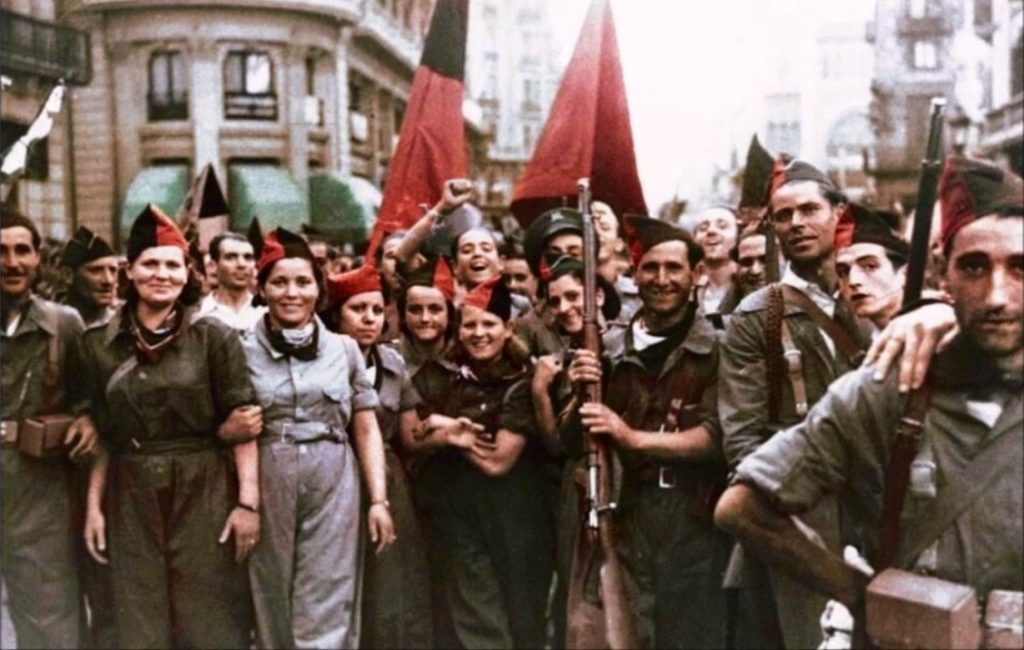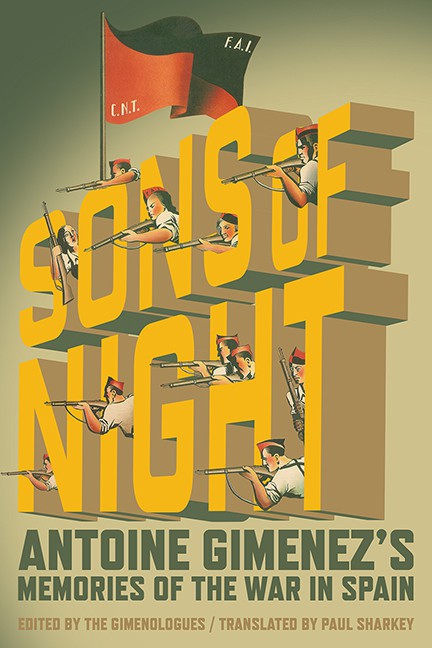
Reviewed: Sons of Night: Antoine Gimenez’s Memories of the War in Spain, by Antoine Gimenez (author); The Gimenologues (editors); Dolors Marín Silvestre (Foreword). AK Press, 2019.
Of the recent windfall of books published around the 80th anniversary of the end of the Spanish Civil War, Antoine Gimenez’s memoir Sons of Night stands out not just for the sheer size of the 730-page tome, but also because it covers a less familiar area of research. The story of the International Brigades is renowned, but what of the international volunteers who came before the brigades were formed or who remained autonomous from their structures?
Twenty-six-year-old Italian Antoine Gimenez was one of those caught up in the events of Spain from the outbreak of turmoil in July 1936. He was part of a wave of “anti-militarists, revolutionaries, Jews, exiles, escapees, everyone who knew persecution by the state,” according to Dolors Marín Silvestre in the book’s foreword, who “flooded into Spain to drink in what it was like to live like fully fledged men and women.”
Because unlike the International Volunteers — predominantly filtered through socialist and communist organizations — who came to fight fascism, these early international participants were drawn to the Spanish conflict for the promise of a new society as a social revolution began to take hold on the republican side of the Civil War.
“In 1936 I was what is conventionally referred to nowadays as a ‘marginal’: someone living on the edge of society and of the penal code,” writes Gimenez. “My sole concern was living and tearing down the established structure. It was in Pina de Ebro [on the Aragon Front] and seeing the collective organized there and listening to talks given by some of the comrades, by chipping into my friends’ conversations, that my consciousness, hibernating since my departure from Italy, was reawakened.”
Antoines’ is an exhilarating and somewhat swashbuckling tale. He was working as a migrant field laborer near Barcelona on the day of the military coup d’etat, July 18, 1936. He immediately joined the tide of Catalan workers and peasants mobilizing to oppose the fascist outbreak and days later is witness to the liberation of the town of Lérida under the auspices of the anarchist Confederación Nacional del Trabajo, (National Confederation of Labour; CNT).
Antoine never feels the need to elaborate on why he throws himself body and spirit into the Spanish cause. “I considered myself an anarchist,” he writes, as if that explains everything. What’s left unsaid, conversely, tells us more about the man.
The reader is treated to a ringside seat of what it is like to be caught up in the maelstrom of a revolution in progress. The Falange (fascist) militia is chased out of town, the armory is looted, priests are summarily executed, jails are opened, and young interred women are released from the monastery. Pandemonium is unleashed upon the streets, and revenge is extracted for generations of subjugation and abuse. In the wake of the initial excesses, “the unions and other revolutionary organizations quickly accepted their responsibilities, and order was completely restored.” Antoine strolls around, euphoric, “watching these people, intoxicated by newfound freedom, trying to build society on new foundations.”
So began the giddy work of redistributing the lands of the fleeing great landlords to impoverished peasants. Popular Committees were set up to organize collectives to take over the provision of essential supplies not just for the population but also for the fighters on the Aragon Front. These were the nuts and bolts of the revolution occurring behind the front lines during the early days of the Civil War, and what appealed so much to Gimenez and his ilk. His enthusiasm is such that, some days later, when the local CNT spontaneously organized a militia to go to the front-lines to repel Franco’s advancing army, he simply jumps on the back of one of the trucks and heads off into war.

Gimenez’s memoir does a good job of capturing the spontaneous and hope-filled mood of the times. The hastily assembled CNT workers’ convoy joined forces with the Durruti Column and trundled off to the Aragon Front to confront the well-trained, professional rebel army. But as everyone knows, it didn’t end well. Despite its passion and enthusiasm, the Column — led by the legendary anarchist Buenaventura Durruti — was eventually destroyed by the enemy with its overpowering aerial superiority in the form of the Nazi Condor Legion, sent by Hitler to support his Spanish allies.
Obviously, Antoine survives to tell the tale, but the manner of his survival is remarkable. Time and again, he escapes skirmishes and ambushes by luck or guile. His unit — the International Group of the Durruti Column, informally known as Sons of Night due to their guerrilla prowess — operated somewhat independently of the main body of the Durruti Column to good effect. But after many successful guerrilla raids behind enemy lines, their good luck runs out on October 16th, 1936. The unit falls into a trap and is surrounded in the village of Perdiguera along the fluid Aragon front-line. Fifty internationals, both men and women, representing a dozen nations, are killed by the advancing Francoist lines, thousands-strong. Somehow Antoine manages to retreat unscathed, apart from being grazed by bullets leaving holes in his sleeve and trousers.
Antoine is the lone survivor of his quixotic international group. It is a jarring moment. Almost everyone we have been introduced to up to this point in the history is now dead.
At times, Sons of Night reads like Ernest Hemingway’s famous Spanish novel For Whom the Bell Tolls, except this of course is memoir, not fiction. If Gimenez’s tales seem too incredible to be entirely true, the book features an extensive and exhaustive historiography that backs up, as far as possible, all his claims. Inspired by Gimenez’s memoirs (originally written in 1972, but unpublished for two decades), an amateur group of historians (calling themselves “The Gimenologues” in honor of the writer, who died in 1982) decided to conduct a rigorous investigation of the events and context of the memoir.
The Gimenologues notes and appendices take up over half the volume and are in themselves a fascinating and illuminating read. For example, they follow the trail of another international volunteer attached to the Sons of Night group, a French woman known as Mimosa (Georgette Kokoczynski). Antoine clearly has a thing for his fellow revolutionary and describes Mimosa as an engaged and dynamic volunteer who “loved living, loving and laughter.”
Minosa’s own account in her previously unpublished diary unearthed by the Gimenologues, portrays a vastly different image – of a woman torn apart by doubt and deeply unhappy with the situation in Spain. “This civil war is a mistake on both sides. But who will dare admit it?” she writes. “In both camps, it is kill, kill, and life is worth no more than an insect.” She and Antoine have an affair on the front-lines that leaves, at least Antoine, all starry-eyed and poetic. It doesn’t even register an entry into Mimosa’s seething diary: “All the dregs make up our column. I believe I have seen what I believe to be the scum of the earth.” One hopes she is not including Antoine in this description.
Mimosa is slain at the battle of Perdiguera. Antoine stumbles across her bloodied, naked body tossed in a ditch. Franco’s soldiers had slashed her belly open, leaving her entrails “spilling from gaping wounds exposed to the sun.” To Antoine’s horror, he realizes that she is still somehow clinging to life. “I wanted to vomit. I thought I was losing my mind,” he writes. “Somebody pulled me away… I watched him shoulder his rifle, then heard gunshots. It was over. I was crying.”
Historians often refer to the Spanish War as “the last great cause,” and Gimenez’s memoir certainly fits into this framing. More fitting perhaps is Albert Camus’ observation that through the defeat of the Republican side “we learned that one can be right and yet be beaten, that force can vanquish spirit, and that there are times when courage is not rewarded.”
Early in the book, Antoine tells the story of a young peasant woman called Juanita, whom he met in Lérida in the heady days of revolution when the political order was being turned upside down and the workers and peasants were taking control. Juanita threw herself exuberantly into the thick of things, participating in the meetings and activities of the new collectives, unleashing all kinds of previously untapped potential and capacity. She and Antoine found each other in the fire of the popular uprising. They kissed one last time as he clambered aboard the militia truck heading off to the Aragon Front. In a kinder world, maybe something could have come of their tantalizing encounter. Instead she would perish a short time later “under strafing by Francoist planes while out in the fields with some other comrades gathering the remaining sheaves of wheat.”
After 730 exciting, charming, frustrating and tragic pages, Sons of Night serves as a long paean to remind us that being brave and resilient, and on the right side of history, is sometimes, devastatingly, not always enough.
Ramor Ryan is the author of two books from AK Press – Clandestines and Zapatista Spring. His latest book translation is Luis Hernández Navarro’s Self-Defense in Mexico: Indigenous Community Policing and the New Dirty Wars to be published by UNC Press.
